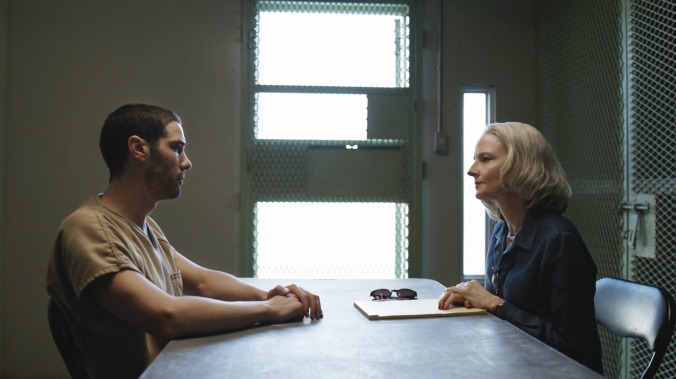The Mauritanian transforms a memoir of unlawful detention into just another shouty courtroom drama
Film Reviews Mauritanian
Note: The writer of this review watched The Mauritanian on a digital screener from home. Before making the decision to see it—or any other film—in a movie theater, please consider the health risks involved. Here’s an interview on the matter with scientific experts.
Regarding the legalities of the War On Terror, there is not much ambiguity: The phenomena of rendition and detention without trial exemplified by Guantanamo Bay were costly national and geopolitical embarrassments that appeared to accomplish very little. As betrayals of putative democratic values, these were outliers only in the sense that they happened under close media scrutiny. Otherwise, they were not all that different from shenanigans that had been going on since at least the days of Dwight D. Eisenhower, when all of the precedents for the subsequent administrations were set: the CIA skullduggery, the deference to oil interests, the move toward global electronic surveillance, the stuffing of one’s cabinet with CEOs. (Eisenhower is celebrated for the warnings about “the military-industrial complex” delivered in his farewell address, but these were really aimed at the incoming Kennedy-Johnson administration, which was going to replace his corporate executives and MIT-accredited advisors with its own.) The true fumble of the enemy-combatant era was that it failed to project a sufficient level of Pax Americana.
Some modest kudos are therefore owed to Kevin Macdonald’s The Mauritanian for not beating around the Bush or feigning doubt about the means and ends. Adapted from a memoir by Mohamedou Ould Salahi (A Prophet’s charismatic Tahar Rahim), a German-educated electrical engineer who was accused of being a recruiter for al-Qaeda and ultimately spent 14 years “detained” at Guantanamo Bay, the film sidesteps the question of guilt altogether to instead focus on the monkeyed machinery of the law: There is no case here that might be admissible in an American court. One can still wish, however, for a little finesse, or at least a movie in which the dialogue doesn’t largely consist of characters shouting into each other’s faces: “It’s systemic!” “I don’t want to hear another word about detainee treatment!”
Much of the volume comes by way of Salahi’s pro bono attorney, Nancy Hollander (Jodie Foster), and her opposite number on the prosecution, Lt. Col. Stuart Couch (Benedict Cumberbatch, with an over-flavored Southern accent). Macdonald (State Of Play, The Last King Of Scotland) and the movie’s producer and co-writer, Martin Bronner (a co-producer on several Paul Greengrass films), are old hands at this kind of straight-from-yesterday’s-magazine-articles drama, and there are long stretches where The Mauritanian feels like a throwback to a more naïve era’s bipartisan approach to issues of national import. Hollander is a dyed-in-the-wool liberal who’s “been fighting the government since Vietnam” and is only interested in her client’s rights; Couch wants him to get him the death penalty. Both stubbornly believe that the only way to prove their points is by making sure Salahi gets a fair trial, and soon find themselves being stonewalled through the process.
There is something admirably self-defeating about the idea of making a legal drama about Guantanamo Bay. It’s revealed that the evidence against Salahi, who admits only to training with the formerly CIA-backed Afghan mujahideen in an al-Qaeda camp back in the early ’90s, consists of summaries of reports and confessions, which neither side is supposed to see. But instead of rising to the challenge of such potentially abstract subject matter, the film opts for clichés: file boxes, lawyer talk over fast food, the classic confrontation in a poorly lit parking lot. Interspersed throughout are flashbacks from Salahi’s years in Gitmo (he has already been there for some time when Hollander and Couch enter the story), in which his friendship with an unseen French-speaking fellow detainee he nicknames “Marseille” figures prominently.
The style is completely pedestrian—that is, until Macdonald decides to go for total psych-out with a lengthy sequence depicting Salahi’s torture. Coming far along in the film, this montage of “extended interrogation,” stress positions, sexual humiliation, and blasted metal, with frequent appearances by a woman in a cat mask, comes close to offering an inspired insight into this country’s nightmares. But as soon as it’s done, The Mauritanian returns to what has long been the default mode of critiquing the American project: people in suits stomping around hallways, talking about the Constitution.
5 Comments
This sounds not only depressing but boring which is a bigger sin.
Some modest kudos are therefore owed to Kevin Macdonald’s The Mauritanian for not beating around the Bush
Yeah, you probably don’t want to do that, you know, with the Secret Service detail and all.
No, they’re talking about Kate. Now, she doesn’t deserve a beating like the Georges do – but the fact is, she’s not as well-guarded.
I got a Mandalorian notification for this?
A Mauritanian never removes his helmet!